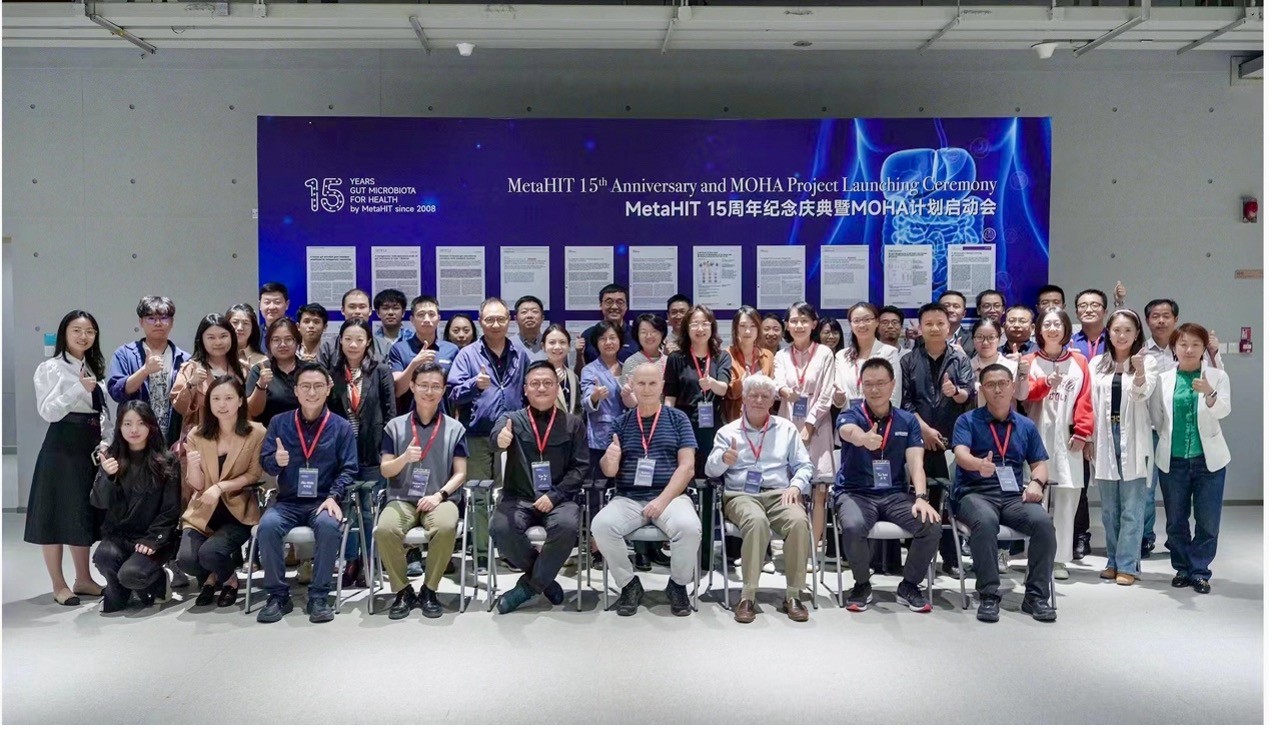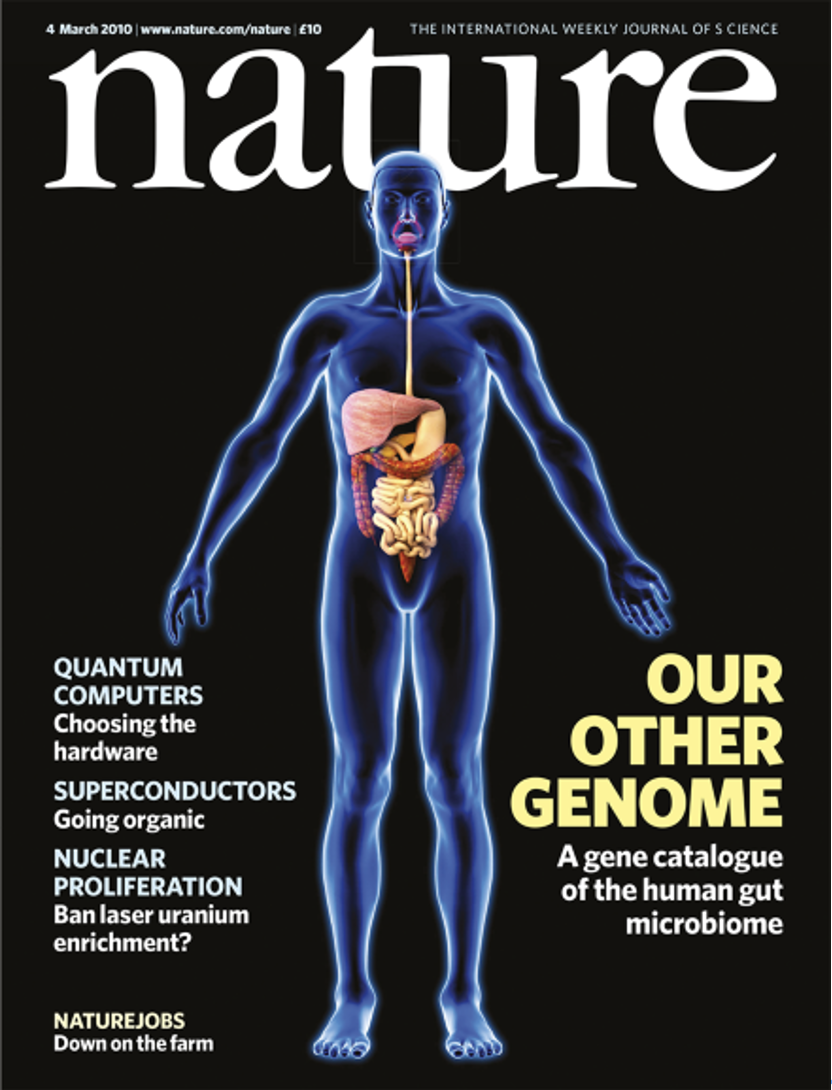On November 23, BGI Group hosted a ceremony to celebrate the 15th anniversary of the MetaHIT (Metagenomics of the Human Intestinal Tract) Project and announced the initiation of a new international collaboration, the "Microbiome-Omics Health Axis Initiative," or MOHA Initiative.
 Group photo of the participants at the 15th Anniversary of MetaHIT Project and MOHA Initiative launch ceremony.
Group photo of the participants at the 15th Anniversary of MetaHIT Project and MOHA Initiative launch ceremony.
The MOHA Initiative represents a new chapter in large-scale international collaboration in microbiome research. As an extension of the MetaHIT and MMHP (Million Microbiome of Humans Project) projects, the initiative aims to further advance microbiome-related health research by constructing a complete microbiome map of the human body, deepening our understanding of the microbiome's role in health, and establishing closed-loop management of health through the microbiome.
The ceremony also highlighted the achievements and impact of the MetaHIT project. Launched in January 2008, MetaHIT aimed to study and establish the association between the genes of the human intestinal microbiota and our health and diseases. Partners in the project included 13 institutions from eight countries, focusing research on microbial communities in the human gut, understanding bacterial species distribution in the human intestine, and providing crucial theoretical basis for subsequent studies on the relationship between gut microbes and diseases such as obesity and intestinal inflammation. MetaHIT was financed by the European Commission under the EU's 7th Framework Programme (FP7).
BGI was the only non-European Union organization involved in the project and undertook the sequencing and subsequent bioinformatics analysis of 124 intestinal microbial samples. In 2010, the BGI-led research, A human gut microbial gene catalogue established by metagenomic sequencing, was published as a cover article in Nature. To date, this paper has been cited more than 7,435 times. BGI has continued to work in the field of intestinal microbiota research, publishing more than 90 research papers related to gut flora.
 Professor Stanislav Dusko Ehrlich (left) and Professor Karsten Kristiansen recall MetaHIT project.
Professor Stanislav Dusko Ehrlich (left) and Professor Karsten Kristiansen recall MetaHIT project.
“BGI was very central to this [MetaHIT] project...importantly, [BGI] created tools that allowed us to assemble short sequences into longer gene size contigs...soon hereafter, BGI said it has assembled 3.3 million genes, it was more than what I expected. The data BGI provided was validated by two independent groups in EMBL (European Molecular Biology Laboratory) and Genoscope (French National Center of Sequencing), and both groups told me that [data] is very good, wonderful,” recalled Professor Stanislav Dusko Ehrlich of University College London, one of the key initiators of the MetaHIT project. “It was wonderful in MetaHIT that we have these two tools [long-read and short-read technology] and we could show what BGI conceived worked very well.”
Another principal initiator of the MetaHIT project, Professor Karsten Kristiansen of the University of Copenhagen, who is also a member of the Danish Academy of Natural Sciences, said, “I think we cannot underestimate the MetaHIT, because before MetaHIT, people were thinking you have to isolate bacteria, you have to sequence. We were doing that again [in MetaHIT], but we had a broader view. I think MetaHIT was the one way that made this possible...I think we have to praise BGI for their efforts.”
 In March 2010, the BGI-led research "A human gut microbial gene catalogue established by metagenomic sequencing" was published as a cover article in Nature. (Credit: Roger Harris /Science Photo Library)
In March 2010, the BGI-led research "A human gut microbial gene catalogue established by metagenomic sequencing" was published as a cover article in Nature. (Credit: Roger Harris /Science Photo Library)
With the advent of high-throughput sequencing, large-scale parallel computing, and bioinformatic analysis tools, the exploration of complex microbial communities within the human body has been thoroughly revolutionized. Over the past 15 years, the rapid development of sequencing technology has led to significant advancements in microbiome studies. Over 50 health issues have now been linked to dysbiosis of the gut microbiota. Increasing evidence suggests that changes in the gut microbiota are intimately related to chronic diseases like gastrointestinal diseases, diabetes, obesity, Alzheimer's disease, and others. Today, research into the human microbiota extends beyond the gut to other areas such as the oral cavity, lungs, skin, and reproductive tract.
Apart from Professor Dusko and Professor Kristiansen, other distinguished participants included Professor Lars Engstrand from the Karolinska Institute's Centre for Translational Microbiome Research (CTMR) and the Sweden National Pandemic Centre (NPC), Professor Lars Bolund from Aarhus University's Department of Biomedicine, and Professor Guang Ning, an academician of the Chinese Academy of Engineering and a tenured professor at Ruijin Hospital.
Dr. Junjie Qin, the co-first author of the 2010 BGI-led MetaHIT project paper, was also in attendance. Additional guests from notable institutions like the Peking University School of Public Health, China Agricultural University, and Washington University School of Medicine in St. Louis, Missouri, also attended the ceremony.



